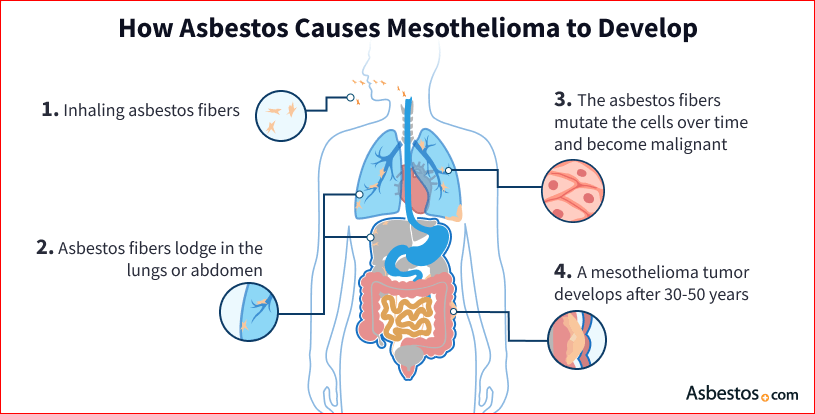
Mesothelioma is a rare but aggressive type of cancer that develops in the thin layer of tissue surrounding major organs, most commonly the lungs (pleural mesothelioma). It is almost always caused by exposure to asbestos, a toxic mineral once widely used in construction, shipbuilding, automotive, and industrial work.
What Causes Mesothelioma?
The primary cause of mesothelioma is asbestos exposure. When asbestos fibers are inhaled or swallowed, they can become lodged in the lining of the lungs, abdomen, or heart. Over time—often decades—this can lead to inflammation, scarring, and the development of cancer.
Occupations at high risk of exposure include:
-
Construction workers
-
Shipyard workers
-
Military personnel (especially Navy)
-
Auto mechanics
-
Industrial and factory workers
-
Electricians and plumbers
Even secondary exposure (from dust on a worker’s clothing) has caused mesothelioma in family members.
Types of Mesothelioma
-
Pleural Mesothelioma – Affects the lining of the lungs; most common type.
-
Peritoneal Mesothelioma – Affects the lining of the abdomen.
-
Pericardial Mesothelioma – Affects the lining around the heart; very rare.
-
Testicular Mesothelioma – Affects the lining of the testicles; extremely rare.
Common Symptoms
Symptoms often don’t appear until 20 to 50 years after exposure. They include:
For pleural mesothelioma (lungs):
-
Shortness of breath
-
Chest or lower back pain
-
Persistent cough
-
Fatigue
-
Unexplained weight loss
For peritoneal mesothelioma (abdomen):
-
Abdominal swelling or pain
-
Nausea
-
Bowel changes
-
Loss of appetite
Diagnosis and Treatment
Because mesothelioma mimics other diseases, it’s often diagnosed in later stages. Diagnosis typically involves:
-
Imaging (X-ray, CT, or MRI scans)
-
Biopsy (tissue sample)
-
Blood tests
Treatment options may include:
-
Surgery to remove tumors or fluid buildup
-
Chemotherapy to kill or slow cancer growth
-
Radiation therapy to target cancer cells
-
Immunotherapy to boost the body’s natural defenses
-
Palliative care to relieve symptoms and improve comfort
Prognosis
Mesothelioma has a poor prognosis, especially when diagnosed late. Life expectancy depends on the cancer type, stage, and patient’s health, but averages 12 to 21 months after diagnosis. However, newer treatments and clinical trials are offering hope and extended survival for some patients.
Legal Rights and Compensation
If you were exposed to asbestos and developed mesothelioma, you may be entitled to financial compensation. Options include:
-
Filing a personal injury lawsuit
-
Making a claim against asbestos trust funds
-
Applying for VA benefits (for veterans)
Experienced mesothelioma attorneys can help identify where and how you were exposed, and pursue the maximum compensation on your behalf—often with no upfront fees.
Final Thoughts
Mesothelioma is a life-altering diagnosis, but you’re not alone. Medical advancements, legal options, and support networks are available to help you fight the disease and protect your family’s future. Early diagnosis and trusted legal guidance can make a meaningful difference.

